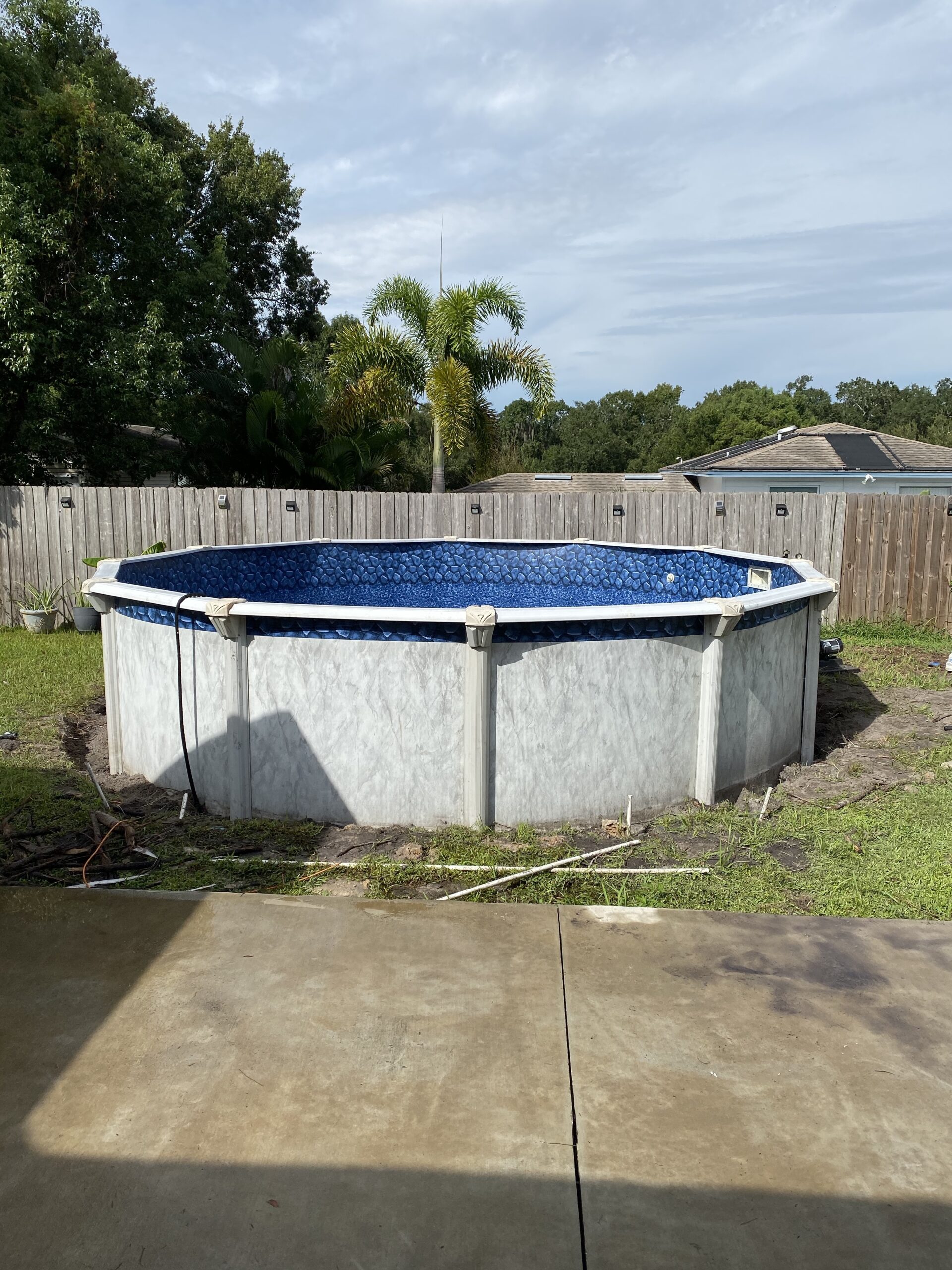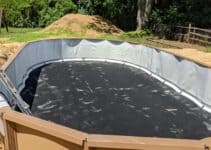During the now 37 years of being in the pool business, I have only learned a couple of things for absolute certainty. One of those things is that swimming pools leak.
As far as I know, there are two kinds of pools – those that leak and those that are going to leak.

So, don’t worry too much if you think your pool has a leak. It can be a pain if it does, but the Industry is used to that and there will be a way to fix it.
It’s very common to only think your above-ground swimming pool has a leak when it’s losing water. In many cases though, the pool isn’t leaking but is instead losing water from evaporation.
BEFORE JUMPING TO A CONCLUSION, TAKE A BREATH AND CONSIDER EVAPORATION
I know the scenario well. It’s late in the season and the pool level is low, so you add water. You haven’t had to add water all summer, but figure it hasn’t rained in a while, so it’s probably normal.
Then a few days go by and the pool is low again. While looking at your pool, you get this sinking feeling and think, “Oh man, I think my pool might have a leak”.
After filling the pool up a second time, your mind starts to wander thinking about the pool leaking, where it might be, how to find it, and what’s it gonna cost.
Four or five days later, your fears are confirmed. The pool’s water level is low, again.
With a slight elevation of heart rate, you pull out your phone or get on the computer to start investigating about pool leaks. Hopefully, at this point, you find this article.
THE MOST COMMON TIME THAT YOU THINK YOU HAVE A POOL LEAK, BUT DON’T
Back in the 1990s, when I had a pool service company, I would notice an uptick in people calling me about their pool leaking at a specific time of year. And that was during the Fall when the air was dry and when the summer rains had stopped.
Weather patterns are different depending on what region you live in. Most areas though have a rainy season and most areas have a humid season.
These are the two factors that determine if people who DON’T HAVE A LEAK think that they do.
COMING OUT OF THE RAINY SEASON
When it’s your rainy season, you never think about a pool leak because the rainwater is always adding water to your pool. In many cases during this time, people will have to drain some water from their pool from time to time.
As the rainy season starts coming to an end, pool owners are not paying much attention to the fact that the pool level is now maintaining itself better (less water being added by rainfall).
When the wet season comes to a complete end, people will start seeing the pool level get low for the first time in months. This is when they start to wonder if the pool is leaking, which is understandable.
COMING OUT OF THE HUMID SEASON
There is another season that affects swimming pools. And that is the humid season. This is the time of year when there is more moisture in the air. You know this because you sweat a whole lot more when you go outside and do stuff.
During this humid season, the air already has a lot of water in it, so it draws less moisture from bodies of water like lakes and swimming pools. So, during this time of wet, humid air, your swimming pool’s rate of evaporation is less.
As your area comes out of the humid season, the air gets drier. And the drier the air gets, the more water it pulls from bodies of water like lakes and swimming pools.
Without really noticing, you are now in the season of dry air. And dry air means the pool’s rate of evaporation has increased, which means it’s losing more water than it has been for a while.
It’s at this time, pool owners will have to add more water to their pools more frequently. This is when they start thinking their pool might be leaking.
MANY AREAS OF THE COUNTRY COME OUT OF THE RAINY AND HUMID SEASON AT THE SAME TIME
In Central Florida where I live and work on above-ground swimming pools, both the rainy and humid seasons can end at about the same time, which is in the mid/late Fall.
So here, when swimming pools stop getting added water from rain AND the dry air start pulling more water from the pool from evaporation, it can easily appear to many that their pool suddenly has a leak.
HOW MUCH WATER CAN AN ABOVE-GROUND POOL LOSE FROM EVAPORATION?
This is the million-dollar question. The answer depends mostly on how dry the air is where you live and somewhat on how windy it is.
The truth is that no one knows what the rate of evaporation is at any given time.
Here in Orlando during the dry season, I have personally recorded as much as a one-quarter inch of water loss per 24 hours from evaporation.
In dry, desert areas (like Phoenix, Arizona), a swimming pool can lose about one-third of an inch per day.
This means that dry air can drop a swimming pool’s water level as much as 2-3 inches per week depending on where you live. Add some wind to that and you may have even more.
POOL USAGE CAN USE WATER TOO
An adult swimmer can pull as many as four gallons of water out of a pool every time they get out of it.
Small kids with a bunch of energy may not be able to pull as much water out, but if they are constantly getting in and out of the pool, the gallons of water that they pull out with them will add up more than you may think.
Splashing and making waves will also contribute to pool water loss. Especially if the water level is high.
HOW TO DETERMINE HOW MUCH WATER YOUR SWIMMING POOL IS LOSING FROM EVAPORATION
Finding out how much your pool is losing from evaporation takes a bit of precision and specific timing.
You will need to mark the pool’s water level every 24 hours and do it well and on time.
For best results, don’t allow any swimming or pool activity during the test.
1 Make sure the pool pump is turned off so the water can be very still
2 Very precisely use a piece of tape pressed against your pool’s very dry skimmer faceplate directly at the level of the pool water. Write the date and maybe the time on the piece of tape.
3 Use a bucket of some kind, fill with about a foot of water and place it directly next to the pool, mark its water level(like you did in your pool).
Make sure the bucket is in a place where kids can’t move it or your dog can’t drink out of it.
4 Make new marks every 24 hours on both the pool’s skimmer plate and the water bucket and record. Do this for at least four days straight.
5 Measure the water level difference between each 24-hour mark in the bucket next to the pool. This will be your daily loss from evaporation.
6 Check the marks at the pool’s skimmer. If the pool lost more water per 24 hours than the bucket did, then the pool is losing water in some way other than from evaporation.
Typically, the bucket and the pool will lose less than an inch during the four-plus days. If you see a noticeable difference between the bucket water loss and the pool, then you may have a leak.
At that point, it’s time to try to find the leak.


Hi, I live in Pennsylvania and have a 24’ above ground pool . I have recently seen it said more than once to never drain your pool . Here it gets cold in September so I usually close the pool for winter taking out the steps adding shock and closing and draining the pump and filter. Since I put a black flow through cover on my pool for winter is it ok for me to drain the water below the skimmer to prevent freezing during winter or should that not be done ??
Thank you for your knowledge
When you hear that you shouldn’t drain an above ground pool, this means that you shouldn’t drain it down all the way. It’s perfectly ok to drain it below the skimmer and return fitting.